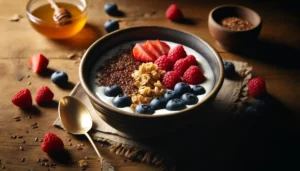Flaxseed for Better Skin
Flaxseed for better skin isn’t just a trend; it’s backed by science. As a superfood, flaxseed is well known for its rich nutritional profile, but its benefits for skin health are particularly impressive.
In this article, we’ll explore how flaxseed can enhance your skin’s elasticity, keep it hydrated, and even reduce sensitivity to UV radiation. Whether you’re dealing with dry skin, wrinkles, or sensitivity, flaxseed might be the natural solution you’re looking for. Read on to discover how this mighty seed can transform your skincare routine and contribute to a healthier, more radiant complexion.
Flaxseed and Improved Skin Hydration
Hydration is essential for soft, supple skin. Well-hydrated skin appears more vibrant and healthy. It’s less prone to issues like flaking and wrinkling. Flaxseed is abundant in essential fatty acids, including omega-3 and omega-6. These fats are vital for the skin’s barrier function. They help retain moisture and prevent dehydration. By strengthening this barrier, flaxseed ensures your skin stays hydrated and radiant.
A study in Skin Pharmacology and Physiology provides compelling evidence. Participants who consumed flaxseed oil, high in these fatty acids, saw significant improvements. Their skin became smoother and more hydrated. These effects demonstrate flaxseed’s role in enhancing the skin’s barrier and overall hydration.

Reducing Skin Sensitivity to UV Radiation
UV radiation poses significant risks to skin health, including premature aging and increased risk of skin cancer. Protecting skin from these harmful rays is crucial for maintaining long-term health and appearance. Flaxseed contains potent antioxidants, such as lignans and phenolic compounds. These antioxidants play a key role in combating oxidative stress caused by UV exposure. They help protect skin cells from damage and inflammation.
Recent Studies on Flaxseed and UV Protection
Several studies have indicated flaxseed’s potential to reduce skin sensitivity to UV radiation, highlighting its antioxidant and protective properties:
- Photoprotective Effect of Flax Seed Oil: A study by Y. Tülüce, H. Özkol, and I. Koyuncu demonstrates that flax seed oil significantly mitigated the effects of UV exposure. This study, published in Toxicology and Industrial Health, focused on flax seed oil’s lignan content and its ability to scavenge oxygen radicals, reducing oxidative stress markers and preventing skin cell apoptosis (cell death).
- In Vitro Study of Flaxseed Lignans’ Antioxidant Properties: Another study, “In vitro Free Radical Scavenging, Anti-Hyaluronidase and Anti-Elastase Potential of Flaxseed Lignans Concentrate” by N. Jayarama Naik and B. Madhusudhan, published in the International Journal of Pure and Applied Biosciences (2018), explores the effectiveness of flaxseed lignans in scavenging free radicals. It suggests potential protective mechanisms against UV-induced skin aging.
Several studies have indicated flaxseed’s potential to reduce skin sensitivity to UV radiation, highlighting its antioxidant and protective properties.
Integrating flaxseed into your diet is a practical approach to enhance your skin’s defenses against UV radiation. It’s a natural way to support skin health and prevent damage from sun exposure.

Flaxseed’s Impact on Hormonal Acne
Hormonal imbalances can trigger acne by increasing oil production and inflammation. Managing hormone levels is crucial for controlling acne. Flaxseed has shown promising results in influencing hormonal balance. A case study on a woman with polycystic ovary syndrome (PCOS) found that consuming 30g of ground flaxseed daily significantly reduced her testosterone levels. After four months, her testosterone decreased by 70%. This hormonal adjustment is key to reducing acne, as high testosterone can increase oil production in the skin.
Flaxseed may correct the hormonal imbalances which trigger acne.
Though more research is needed, initial findings suggest that flaxseed may help balance hormones that contribute to acne. For individuals experiencing hormonal acne, incorporating flaxseed into their diet could be a beneficial and safe strategy to improve skin clarity.
Flaxseed’s potential to regulate hormones and reduce acne symptoms provides a compelling reason to include it in a skincare-focused diet.

Systemic Support For Better Skin: Flaxseed for Gut Health
Flaxseed is not only beneficial for your skin directly but also supports overall health, starting with the gut. A healthy gut contributes significantly to a healthy complexion, particularly for conditions like acne, rosacea, psoriasis, and eczema. A healthy gut plays a critical role in maintaining overall health and, by extension, skin health. The gut-skin axis suggests that intestinal health directly affects skin quality due to the interaction between gut flora, inflammation, and immune response.
How Flaxseed Supports Gut Health
- High in Soluble Fiber: Flaxseed is rich in soluble fiber, which promotes regular bowel movements and aids in the maintenance of a healthy gut flora. This fiber serves as a food source for beneficial bacteria in the gut, fostering a balanced microbiome.
- Rich in Omega-3 Fatty Acids: Omega-3s in flaxseed strengthen the gut barrier, reducing inflammation throughout the body, including the skin. A strong gut barrier prevents harmful substances from leaking into the bloodstream and triggering inflammatory responses that can affect the skin.
A healthy gut contributes significantly to a healthy complexion, particularly for conditions like acne, rosacea, psoriasis, and eczema.
Research increasingly shows a connection between gut health and various skin conditions. For example, disturbances in gut flora have been linked to skin issues like eczema and rosacea. By improving gut health with flaxseed, individuals may see a reduction in these skin symptoms.
How to Incorporate Flaxseed into Your Diet
Flaxseed is not only beneficial for your skin but also easy to incorporate into your daily diet due to its versatility. Here are some practical ways to enjoy the health benefits of flaxseed:
Start with Breakfast
- Smoothies: Add ground flaxseed to your morning smoothie for an extra nutrient boost.
- Oatmeal or Cereal: Sprinkle ground flaxseed over your oatmeal or cereal. It adds a nutty flavor and a boost of fiber.
- Yogurt Parfaits: Mix flaxseed into your yogurt with fruits and nuts for a delicious and healthy parfait.

Incorporate into Baked Goods
Baking with flaxseed is a fantastic way to enhance the nutritional value of homemade breads and desserts while enjoying its health benefits. Here’s a simple recipe for flax bread that you can try at home:
Simple Flax Bread Recipe:
- Ingredients:
- 6 1⁄2 cups all-purpose flour, divided
- 3⁄4 cup ground flax seeds (flax meal)
- 3 tablespoons sugar
- 2 teaspoons salt
- 1 tablespoon fast rising instant yeast
- 2 cups water
- 1 cup milk
- 1 tablespoon vegetable oil
- Directions:
- Set aside 1 cup flour.
- Mix remaining flour, flax seed, sugar, salt, and yeast in a large bowl.
- Heat water, milk, and oil until hot to the touch (about 125-130°F) but DO NOT BOIL.
- Stir the milk mixture into the dry mixture. Mix in enough reserved flour to make a soft dough that does not stick to the bowl.
- Turn out onto a floured board and knead until smooth and elastic, about 8 minutes.
- Cover dough and let rest 10 minutes.
- Divide dough in half and shape into loaves.
- Place into 2 greased (8 ½ inch x 4 ½ inch) loaf pans.
- Cover and let rise in a warm place until dough has doubled in volume (about 40-50 minutes).
- Bake in a preheated oven at 400°F for 30-35 minutes.
- Remove from pans and cool on wire racks.
This bread is not only delicious but also packed with the goodness of flaxseed, making it a great choice for your skin and overall health. Give it a try and enjoy the wholesome benefits of baking with flaxseed!

Lunch and Dinner Ideas
- Salad Dressing: Use flaxseed oil as a base for dressings. Its nutty flavor complements a variety of salads.
- Soups and Stews: Stir a spoonful of ground flaxseed into soups or stews to thicken them and add a nutritional punch.
- As a Topping: Sprinkle ground flaxseed over cooked vegetables or incorporate it into your sauces.

Snacks
- Smoothie Bowls: Top your smoothie bowls with a sprinkle of ground flaxseed for a crunchy texture.
- Homemade Granola Bars: Add flaxseed to your homemade granola bars for an extra dose of omega-3 fatty acids.
Drinks
- Tea: Some people add a teaspoon of flaxseed oil to their hot tea to enrich it with a distinctive, nutty flavor.

References
- Development of skincare formulations using flaxseed oil and mucilage. Journal of Pharmacognosy and Phytochemistry
- Supplementation of flaxseed oil diminishes skin sensitivity and improves skin barrier function and condition. Skin Pharmacology and Physiology
- Photoprotective effect of flax seed oil against ultraviolet C-induced apoptosis… Sage Journals
- Systematic review of flaxseed extract andformulation in wound healing. Journal of Pharmacy & Pharmacognosy Research
- Physiological and Pathological Considerations for the Use of Flaxseed as a Therapeutic Dietary Strategy. Reviews in Cardiovascular Medicine
- The Effect of Flaxseed Supplementation on Hormonal Levels… Current Topics in Nutraceutical Research
- The Effects of Omega-3 Fatty Acids and Vitamin E Co-Supplementation on Indices of Insulin Resistance and Hormonal Parameters… PubMed
- Linking diet to acne metabolomics, inflammation, and comedogenesis… Clinical, Cosmetic and Investigational Dermatology
- Intervention with flaxseed and borage oil supplements modulates skin condition in women. British Journal of Nutrition
A Note to Commercial Bakeries

- You can easily create delicious flax-based keto-friendly bakery products which are clean label, high protein, high fiber and plant-based!
- Recipes provided on all bulk orders, with ongoing customer support
- Worldwide shipping
- To order, visit our wholesale distributor, SnowCap Enterprises, and search: Powerflax Gold Low Carb Mix (SNC80).
- Get in touch with us!

